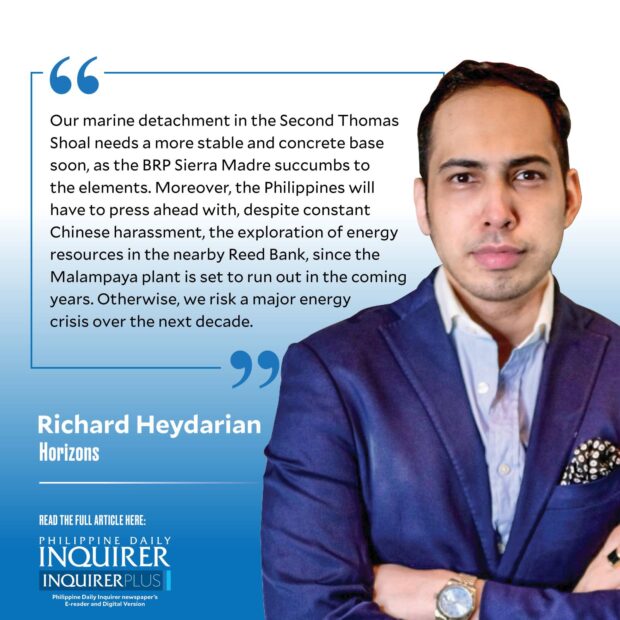
Since the advent of the COVID-19 pandemic, the self-described “benevolent” regime in Beijing conducted multiple massive naval drills across its adjacent waters, while issuing yet another dubious “national map” that encompasses a whole host of contested territories from Eurasia to the Himalayas and the West Philippine Sea. Even allied Russia was incensed.
Just weeks earlier, China’s feverishly peevish diplomats were at it again. When Philippine authorities exposed the widespread destruction of our ecological heritage in the West Philippine Sea, a Chinese diplomat dismissively said, “We urge relevant party of the Philippines to stop creating a political drama from fiction.”
Then, in yet another exercise in “whataboutism,” the paper pusher in Beijing went on to say, “If the Philippines truly cares about the ecological environment of the South China Sea, it should tow away the illegally grounded warship [Sierra Madre] at Ren’ai Jiao [Second Thomas Shoal] as soon as possible.” Things got pretty interesting when the Chinese diplomat went as far as accusing the Philippines of “discharging polluted water into the ocean” and allowing a “rusting warship bring irrevocable harm to the ocean.”
Dear readers: What we are confronting here is nothing less than “strategic gaslighting” on steroids! Whenever faced with criticism, or incontrovertible evidence of misconduct, Beijing’s paper-pushers respond—almost in ChatGPT-like fashion—by blaming victims of China’s rising assertiveness.
Facts first: It’s China that is violating international law, not the Philippines. Based on the 2016 arbitral tribunal ruling at The Hague, under the aegis of the United Nations Convention on the Law of the Sea, the resource-rich lagoon located within the Scarborough Shoal is a “common fishing ground,” thus China has no right to block our fishermen from roaming the area.
To put things into geographic perspective: the Scarborough Shoal is located just above 200 kilometers off the Philippine coast, but it’s nearly 900 kilometers away from China’s nearest real island, namely the province of Hainan. One must be quite a “maritime Karen” to accuse Filipino fishermen of being the trespassers in the area.
As for the Second Thomas Shoal, it’s not even a territory to be claimed by China. The arbitral tribunal also made it clear that the shoal is a “low-tide-elevation,” which falls within the Philippine exclusive economic zone. So, it’s none of anyone’s business what we do within our own waters.
As for ecological balance, China has already been censured by the tribunal at The Hague for causing widespread environmental damage through its heavily destabilizing reclamation activities across disputed areas. Those “fake islands” built over Mischief Reef and a whole host of Spratly Island features don’t give China any legal right over the contested area, yet they could pose a serious military threat to freedom of navigation and overflight in a vital international waterway.
The situation has gotten so preposterous that even President Marcos, a conflict-avoidant person by temperament, seems to have lost patience. As Mr. Marcos reportedly told his executive secretary, “I thought the Philippines was the friend of China?”
To put it mildly, Mr. Marcos is facing a very delicate situation in the West Philippine Sea, where he is confronting two ticking time bombs at once. On one hand, our marine detachment in the Second Thomas Shoal needs a more stable and concrete base soon, as the BRP Sierra Madre succumbs to the elements. Moreover, the Philippines will have to press ahead with, despite constant Chinese harassment, the exploration of energy resources in the nearby Reed Bank, since the Malampaya plant is set to run out in the coming years. Otherwise, we risk a major energy crisis over the next decade.
On both fronts, Mr. Marcos will not only have to resist China’s strategic gaslighting but also muster the strategic courage to pierce through Beijing’s Great Wall of intimidation. What’s at stake is nothing less than our territorial integrity, the livelihood of millions of Filipinos, and trillions of pesos in untapped fisheries and energy resources within our own waters.
—————–
rheydarian@inquirer.com.ph